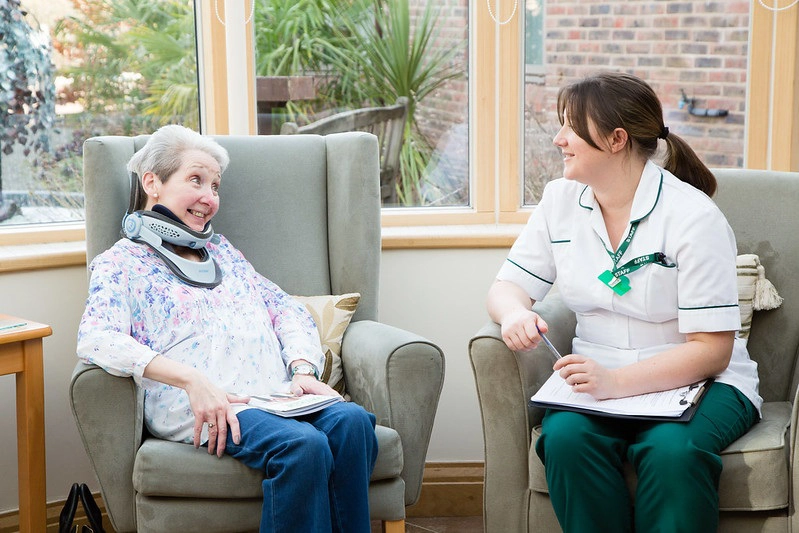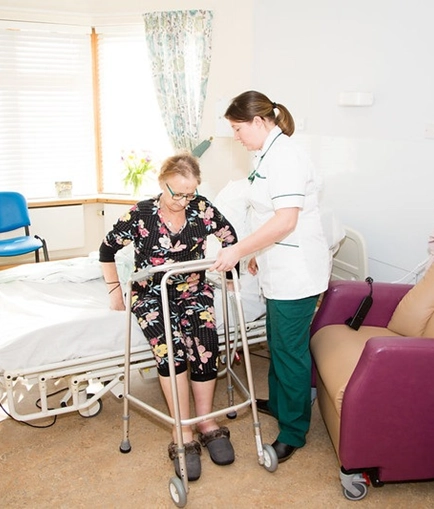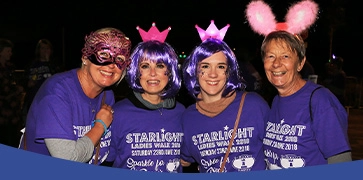
About me:
My name is Jane and I have worked at St Rocco’s for about 8 years. I knew from about the age of 12 that I wanted to be an OT. My grandad had MS – he was a wonderful man, fiercely independent but I was aware that he didn’t have much functional support. His speech affected him and I used to wonder why there was no-one who could make life easier for him and my Nana.
I am interested people’s spirituality and understanding what makes them the person they are. After working with Macmillan nurses during my career in hospitals, I realised that palliative care was the speciality I was most passionate about.
I feel as an OT, palliative care is a specialism where we can make a positive impact on someone's quality of life through changing their technique, specialist palliative rehab and providing aids and adaptations.
My role:
Specialist Palliative Occupational Therapy is person-centred. I focus on the individuals' functional abilities, and we work out what we can do together to maximise their independence. The aim is to give the individual a sense of control around their symptoms and to work on achieving their goals
As a Specialist Palliative OT, I aim to support and provide therapy for various symptoms including fatigue, breathlessness and anxiety as well as providing psychological support.
I am constantly fact finding to find the core of what is important to an individual so that I can help them engage in activities that make them feel valued within their current capabilities. I then use my knowledge and experience of different conditions and the trajectory of illnesses to help individuals maximise their functional independence at every stage and predict what extra support they may need in the future.
As a Specialist Palliative Care OT, I have an understanding and expertise around how different diseases progress so I can stay ahead of potential needs. However, what is important to the individual is always my priority as their participation in sessions is crucial. This could include specialist equipment or adaptations for the home or for mobility or it could include advice and guidance on aspects like posture, movement and breathing.

A typical day:
People change and their needs change so being flexible is a really important part of every day. There is a lot of clinical triage, contacting other professionals and receiving feedback from care agencies. Referrals come from everywhere including care agencies, GPs, Macmillan nurses and the Integrated Palliative Care Hub at the hospice. At the start of each day, I triage my case load and make sure that everyone booked in is still ok for my visit. Being efficient means we get to see as many people as we can each day.
One moment I will always remember:
I worked with a gentleman a couple of years ago and his wife was very anxious about caring for him. She didn’t believe she could be a carer and she told me she didn’t feel confident delivering care. I spent time with her talking about mindfulness and about how she didn’t need to worry about the changing care needs as we can support her at every step. She understood the concept and shifted her mindset to know that she could do it. The gentleman did go home and she did look after him. I felt by listening to her needs we could address her fears and explore this together to increase her confidence in caring for her husband.
What I enjoy most about my role:
I love listening to people and learning about their lives. I hope that my role provides hope and support and that I can make a difference. My aim is to find out what is valuable to each individual so that they can still find quality in their lives. My job is about doing the living part of dying and that is such a privilege. I couldn’t imagine doing anything else!


Share Article